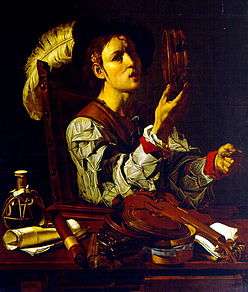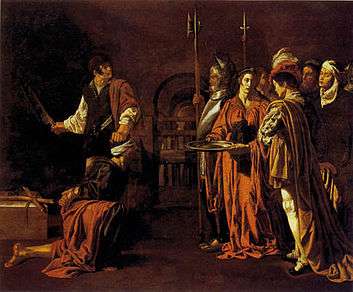Cecco del Caravaggio
 | |
| Artist | Cecco del Caravaggio |
|---|---|
| Year | c. 1610–1620 |
| Medium | Oil on canvas |
| Location | National Museum in Warsaw |
Cecco del Caravaggio (active c. 1610 – mid-1620s), is the name used for a Baroque artist working in Rome in the early decades of the 17th century, an important early follower of Caravaggio. He has been identified as Francesco Boneri (or Buoneri), although this is not universally accepted.
Little is known about Cecco del Caravaggio. In his guide to contemporary artists written for fellow-collectors in about 1620, Considerazioni sulla Pittura, Giulio Mancini mentions a 'Francesco detto Cecco del Caravaggio' as one of the great master's more noteworthy followers. A 'Cecco' is recorded among French artists working with Agostino Tassi at Bagnaia in 1613–15, and hence the artist has been thought to be of French origin, while other scholars have detected a Spanish influence, but in 2001 the scholar Gianni Papi identified this Cecco del Caravaggio as the Lombard artist Francesco Boneri (or Buoneri), and this now seems to be generally although not universally accepted.
None of Cecco's works are signed or dated and hence his oeuvre is difficult to identify, but he is associated with a number of genre pieces, portraits and religious works showing a clear debt to Caravaggio. His more important religious works include his Resurrection now in the Art Institute of Chicago and his Christ Expelling the Money Changers from the Temple.[1]
An identification has also been made, (notably by the journalist Peter Robb in his 1998 biography of Caravaggio, M-The Man Who Became Caravaggio), between Francesco Boneri/Cecco del Caravaggio and the boy who models for a number of paintings done by Caravaggio in the period 1600/1606, including the famous Amor Vincit and the John the Baptist in the Capitoline Museum in Rome. The identification is based on the statements found in early authors that the model for Amor Vincit was a boy named Cecco who was also Caravaggio's servant and possibly pupil. As attractive as this idea is, it remains unproven.
Gallery
- Cecco del Caravaggio
 Guardian angel
Guardian angel Young man with musical instruments
Young man with musical instruments Beheading of St. John the Baptist
Beheading of St. John the Baptist Woman with a Dove
Woman with a Dove Fluteplayer
Fluteplayer The Resurrection
The Resurrection
References
- ↑ "Cecco del Caravaggio's Resurrection" (PDF). Retrieved 2010-06-08.
- Peter Robb, M-The Man Who Became Caravaggio, 1998 [ISBN 1-876631-79-1]
- Richard Spear, Caravaggio and his Followers, 1975 [ISBN 0-06-430034-X]
Bibliography
External links
| Wikimedia Commons has media related to Cecco del Caravaggio. |